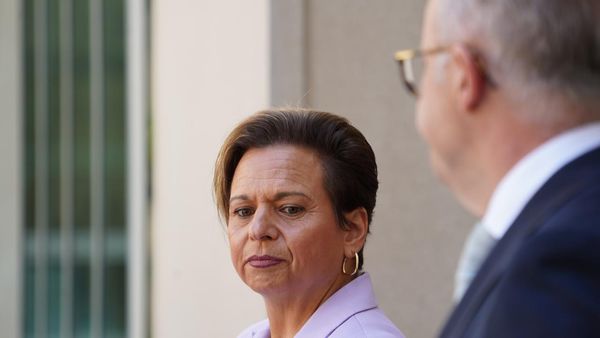WASHINGTON — Disability rights advocates say if lawmakers want to honor Sen. Bob Dole’s legacy, they should finally ratify a United Nations treaty on disability rights the Kansas Republican icon championed in his later years.
But advocates acknowledge that passing the UN Convention on the Rights of Persons with Disabilities in the evenly divided Senate will be difficult even with President Joe Biden’s backing.
The international agreement commits nations to ensuring equality of opportunity for people with disabilities, but Republicans have largely opposed the measure on grounds that it encroaches on U.S. sovereignty despite Dole’s advocacy.
Biden’s campaign platform included U.S. ratification of the international agreement, already approved by 182 countries, after attempts during former President Barack Obama’s administration fell short.
“After we’ve grieved and we’re in the reflection period, I would hope that senators would realize this is something Sen. Dole very much wanted,” said Rocky Nichols, executive director of the Disability Rights Center of Kansas. “It could be part of his and their legacies on disability rights. And frankly, it should be passed.”
Dole, whose right arm was paralyzed from a battlefield injury sustained in World War II, centered his maiden Senate speech in 1969 on disability rights and in 1990 as the Senate Republican leader he ensured bipartisan support for the Americans with Disabilities Act.
The UN convention is largely based on the principles of ADA and Dole was heavily involved in advocacy efforts for its ratification. Nichols called ratification of the treaty the unfinished piece of Dole’s legacy.
Dole used his privileges as a former senator to sit on the chamber’s floor during a 2012 vote and watched as the treaty fell short of the two-thirds majority needed for ratification after the bulk of his party voted against it, including both Republican senators from his home state of Kansas.
“One of the things that was very disheartening to me — not just as a disability advocate but also as a Kansan — was to see Sen. Dole go on the floor of the U.S. Senate and to see Republican colleague after colleague, including our two senators, go up to Sen. Dole and embrace him,” Nichols said.
“And then Republican senator after Republican senator turns around and votes against the Convention on Rights of Persons with Disabilities, the very reason Sen. Dole was on the floor.”
The United States is one of only a handful of nations and the only global superpower that hasn’t ratified the treaty, which commits member nations to principles of accessibility and equality for disabled people.
Maria Town, president and executive director of the American Association of People with Disabilities, said the U.S. risks falling behind other nations on disability policy as a result.
“The nations who have ratified the treaty have all been in conversation and community with one another. And what that creates is this opportunity to really advance what best practice is on an international scale. And the U.S. as an entity that has not ratified the treaty is not privy to those conversations,” said Town, who oversaw outreach to the disability community for the Obama White House.
In his 2020 campaign platform’s section on disabilities, Biden pledged to “work with the Senate to ratify the Disabilities Treaty and regain our global standing as a leader on disability rights.”
But the White House did not respond to multiple inquiries this week about what Biden has done to fulfill this promise or what strategy his administration will use for advancing the treaty in the Senate, which has only grown more polarized in the years since the 2012 vote.
Sen. John Barrasso, R-Wyoming, a member of Senate GOP leadership and one of the few Republicans to support the measure in 2012, said he still supports the treaty, which he said ensures the rights of Americans with disabilities when they travel overseas.
“I was proud to stand with Bob Dole in supporting opportunities and rights for individuals with disabilities. The United States is already leading the way on this issue. This agreement would make sure all Americans with disabilities are guaranteed these same protections while traveling abroad,” Barrasso told McClatchy in a statement.
But swaying the GOP holdouts won’t be easy even as many Republicans note Dole’s record on disability rights in their tributes. Sen. Jerry Moran, R-Kansas, who holds Dole’s old Senate seat, hasn’t changed his opposition since 2012.
“I don’t think the United Nations should be making determinations about domestic policy in the United States.”
Kansas’ new senator, Republican Sen. Roger Marshall, who took office this year, signaled he was open to the policy but remained non-committal.
“I support the concept but I would want to go back and see if there was anything specifically in that legislation that we wouldn’t be comfortable with. Senator Dole was a great champion for people with disabilities, a great Kansan,” Marshall told McClatchy.
Curt Decker, the founding executive director of the National Disability Rights Network, said ratifying the treaty is more about the U.S. affirming its commitment to disability rights internationally than changing policies within its border.
“The convention was pretty much based on the ADA. I don’t think there was anything in that UN convention that would have held the U.S. to something more severe,” said Decker, who worked closely with Dole on the ADA. “The incredible irony that we were one of the only countries that ended up not endorsing it was ludicrous .”
Ami Hyten, executive director of the Topeka Independent Living Resource Center, which serves individuals with disabilities in Kansas’ capital city, said Dole remained committed to ratification in the years after the 2012 vote. She said she was hopeful that his death could spur movement on the issue, but she’s skeptical lawmakers from Dole’s home state will take up the cause.
“It would be good to see that push happen again. There are a lot of us who have continued to really feel in particular that a more international lens on disability rights and access is needed for a long time,” Hyten said. “So I’d love to see that, but from the Kansas delegation I don’t see a lot of hope.”
While passage of the treaty remains a goal for the disability community, Town argued a more urgent way lawmakers could honor Dole’s commitment to disability issues would be through the passage of Biden’s domestic agenda.
“How do we appropriately honor his legacy? And I think in addition to ratifying the Convention on the Rights of People with Disabilities, there are some other opportunities that have a very, very real possibility of actually happening,” Town said, noting that the spending bill currently before the Senate includes $150 billion for home and community-based services.
“That would directly benefit disabled people,” she said.
____







